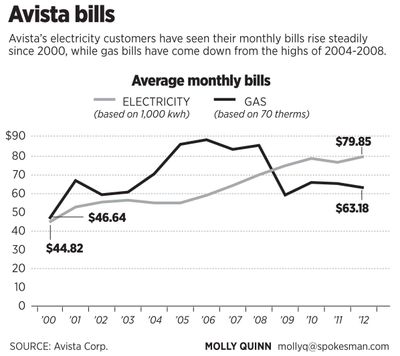Avista proposal decried as too high
State challenges utility’s latest rate hike request

Avista Corp. is asking too much of its customers in its latest push to raise rates 6.3 percent for electricity and 6.9 percent for natural gas, the Washington Attorney General’s Office and the state Utilities and Transportation Commission’s staff said Wednesday.
The Spokane-based utility proposes the higher rates to raise an additional $40.9 million from electric customers and another $10.1 million from natural gas customers in Eastern Washington.
Avista’s request is “an unjustified burden on customers” so soon after the utility raised rates at the start of this year and after a decade of nearly annual rate increases, said Senior Assistant Attorney General Simon ffitch.
“Unfortunately it’s a revolving door from the consumer perspective,” ffitch said Wednesday. “I think customers are worn out, they’re frustrated, they’ve given and they’ve given and they’ve given again, and they’re tapped out in terms of ability to pay these rate increases, which just keep on coming.”
The Public Counsel Unit of the AG’s office, which filed a challenge of Avista’s latest rate case Wednesday, proposes shaving more than $30 million from the electric request and knocking more than $4 million off the gas request.
The UTC staff went further, recommending the commission reject the company’s proposed electric rate hike altogether. Instead, the staff recommends an overall revenue reduction of $1.3 million.
The commission staff also recommended a lower increase in Avista’s natural gas revenues – $4 million.
The three-member commission will make a final decision on the utility’s rate request this winter, and new rates likely would go into effect next March for Avista’s 237,000 electric customers and 149,000 natural gas customers in Eastern Washington.
Avista spokeswoman Anna Scarlett said the utility is confronting higher costs to maintain and upgrade generation plants, power lines and gas pipelines.
“We’re not the only utility facing rising costs in an aging system, and we expect that those costs will continue to go up,” Scarlett said.
About 40 percent of customers’ bills covers equipment and employee costs to provide energy service, she said.
“When we replace and update that old equipment with new equipment and technology, it costs at times magnitudes more than it did when it was originally installed,” Scarlett said. “Those are the costs that are going up.”
But ffitch said expert analysis of Avista’s case for the higher rates “has found that Avista’s request is excessive and there are a number of flaws in the case that we think give the commission a basis to dramatically reduce the size of the request.”
The Attorney General’s Public Counsel section recommends that the commission:
• Eliminate or greatly reduce Avista’s request for a $20 million “attrition” adjustment, which the company argues is designed to address regulatory lag in recovering the cost of new plant additions.
• Reject the company’s request to increase the customer charge by 67 percent, raising the basic monthly charge customers pay by $4, to $10 per month. The Public Counsel recommends a smaller increase.
• Reduce amounts in rates related to executive compensation and board of director costs by $1.8 million.
• Correct a $2.9 million error in Avista’s case regarding claimed federal income tax expense.
• Reject the Northwest Energy Coalition’s request to allow Avista to recapture a portion of electric revenues it loses due to the company’s energy-efficiency programs.
The UTC staff recommends rebalancing rates among industrial, commercial and residential customers, reducing overall revenues for Avista.
The average residential electric customer using 1,000 kilowatt-hours per month would pay 32 cents more under that recommendation, for an average monthly bill of $80.17.
The typical residential gas customer using about 68 therms a month would pay about 66 cents less.
Basic service charges for electric customers would increase from $6 to $7.34 a month under the UTC staff recommendation. Natural gas customers would see their basic service charge go up from $6 to $10.98 a month.
The commission staff also recommends that Avista be allowed the opportunity to earn a 7.22 percent overall rate of return, not the 8.25 percent the company requested. The UTC staff also recommends lower power-supply costs, income taxes and executive compensation than the company originally sought.
Even as it seeks approval for higher rates to cover delivery costs in 2013, Avista this year has reduced natural gas rates due to lower wholesale costs. That includes a 6.4 percent decrease on March 1 and a proposal this week to lower gas rates another 4.4 percent this fall.
Together those reductions would lower gas bills, even if Avista’s proposed gas rate increase of 6.9 percent is approved.